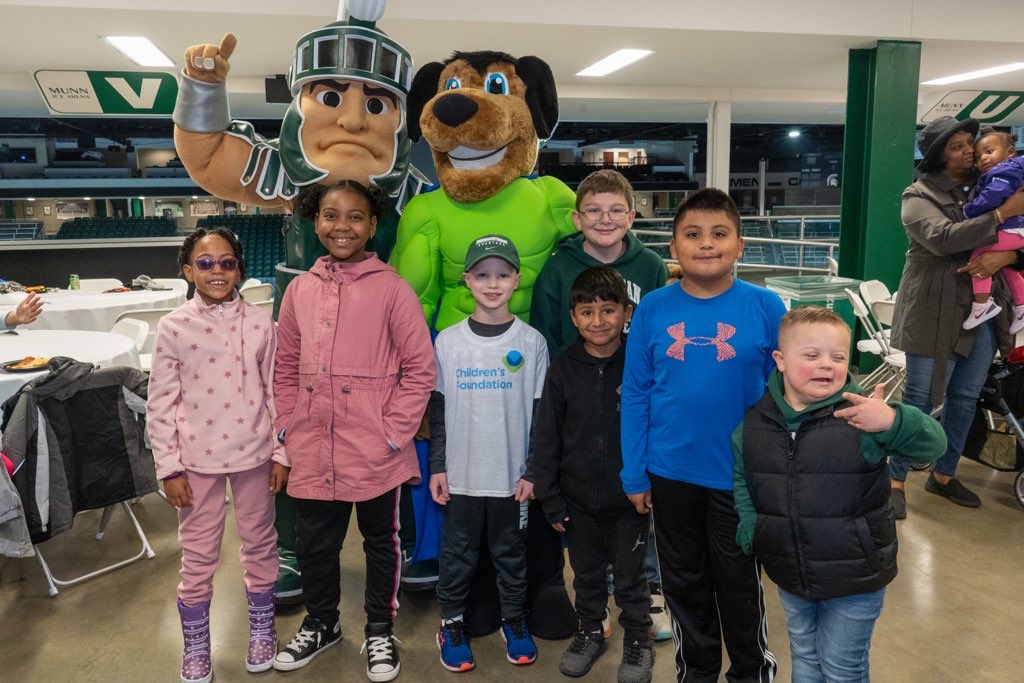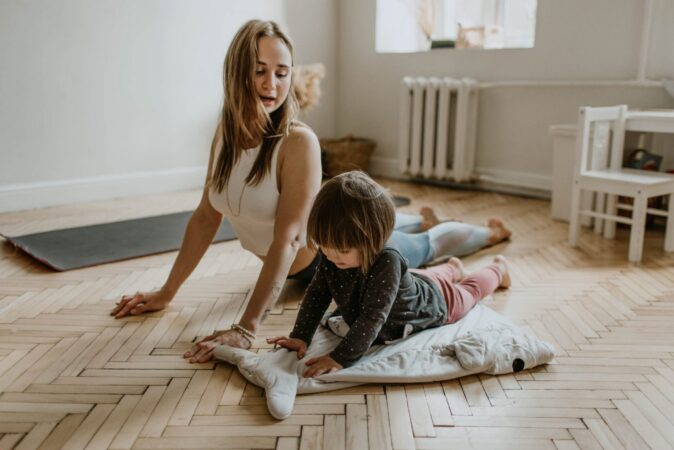Stop. Slow down. Take some deep breaths.
Breathe deeply for a moment.

CHILDREN’S HOSPITAL OF MICHIGAN
Perhaps the largest factor in the mental health and anxiety levels of your children during the COVID-19 crisis are the anxiety levels and mental health of you, person reading this, right now.
“For the little ones, they really don’t understand so they really can’t comprehend what pandemic is or what we’re dealing with, and what will scare them is if everyone around them is anxious,” said Dr. Eric Herman, Clinical Psychologist at Children’s Hospital of Michigan.
“What people can do is try as best they can for themselves and their families and children to remain calm even though they’re concerned and worried. They need to show that to the kids— everything is going to be ok.”
He was echoed by Ashton Taylor, a clinician at Henry Ford Health System.
“If you, as a parent or an adult, are in a place where your anxiety is very high? Talk to someone about it,” she said. “Because the last that we want to do is send the message to our children that we need to be scared and fearful. We want to send the message that we will get through this.”
Mental health professionals and advocates for children in the Metro Area and nation are suggesting making mental health— for both ourselves and our children— a priority during this time.
Keeping calm for the children around you is the first step. The second? To begin to understand mental health and healthy practices. There are tools to help deal with the mental health effects of crises. The good news is, many of the steps are similar for adults and children and can be taken together.
We will reach a point in this pandemic when many of us will see our friends and loved ones get sick, and we will even see some of those people struggle, and die. Perhaps it’s already happening.
It’s ok to grieve, to be scared and uncertain and not have the answers for what the future holds. It’s ok to not be ok. This situation is not normal. Understanding that there’s no shame in asking for help or having strong feelings.
There are also far more important issues than keeping up with math homework for the kids and being just as productive at work as before for the parents.
“What will be more important during this time is we took care of our health, our mental and physical health, particularly our children’s mental health, that we supported them,” said Doreen Marshall, Ph.D. Vice President of Programs American Foundation for Suicide Prevention and author of a viral Facebook post about caring for mental health during Coronavirus.
“I think that’s going to bear out much more important than the focus on academics. You can always catch up on schoolwork.”
Marshall suggested separating what you can control from what you can’t, safely getting outside, and if possible, into nature, and staying connected to friends and family via electronic means.
Four main factors to positive mental health also include getting adequate sunlight and exercise, eating healthy, and particularly important for children and young adults out of school, keeping a schedule. This helps to stave off uncertainty and create stability and rhythm for worried young minds.
Julia Putnam, Principal at the Grace Lee and James Boggs School, promotes keeping children and young people on a schedule, one they have some say in, without pushing them too hard.
“Kids need the semblance of normalcy and routine and something to expect everyday,” she said. “Our kindergarten teacher is still doing her morning meeting virtually every morning. The kids can watch a video of her doing the routine they would do every morning.”

ACTIVITIES THE CHILDREN’S FOUNDATION DOES WITH YOUTH.
Additionally, she said it was important to explain to young ones exactly what’s happening and why life is changing.
“Kids will make up stuff in their head, and it can be really horrible scenarios if they don’t place it in context and help them understand why we’re doing what we’re doing,” she said. She explained to her students and her own children, “We’re staying in our homes in order to help other people stay safe and to make sure hospitals aren’t overwhelmed. What we’re doing right now is a community service, it’s not like jail.”
Also know that behind the scenes, many community leaders are working to help make sure our children have what they need, including caring for the unique needs of mental health.

LARRY BURNS CEO THE CHILDREN’S FOUNDATION
“We believe that the environment children and families live in, which are called the social determinants of health, very much impact your mental wellbeing,” said Lawrence J. Burns, President and CEO of The Children’s Foundation. “We are acting fast and nimble, and we’re giving money now to impact kids today or tomorrow, not just three weeks from now, which is important too. ”
The Children’s Foundation of Michigan has made mental health one of their missions over the last few years, due to requests from partner organizations. This crisis is no different.
They’ve made more than a dozen $10,000 grants to partner organizations since the beginning of the crisis. Brilliant Detroit, an organization that provides services to children in high-needs neighborhoods around Detroit is one of those recipients.
“The support they have given Brilliant Detroit will go towards getting food, play and learn at home kits, weekly calls and resources by neighborhood to the 6500 individuals we serve,” said Cindy Eggleton. “The number one thing we’re concerned with right now is social, emotional and mental health wellbeing.”
She added “community and connection” are one of their main focuses during Covid-19, and vital to staying healthy during times like these.
“We are there for you,” she said. “We keep emphasizing that there are others out there that are there to support and be part of.”
Children’s Mental Health
CHILDREN AND YOUNG PEOPLE TAKE THEIR CUES FROM ADULTS
If you’re anxious, they are too. Be kind to yourself. It will help you be kind to others. Keep healthy habits. Go slow.
PRIORITIZE MENTAL AND PHYSICAL HEALTH
The economic situation is tough and anxiety-inducing, but you don’t have to write the next King Lear or Moby Dick during quarantine, nor do you have to break any sales records at work if you’re able to work from home. It’s OK to get less accomplished, to take more time for childcare, to check in with family and friends.
ROUTINE IS IMPORTANT
Especially for children. It helps stave off uncertainty and establish rhythm. If school lessons help, do them, but there are more important things than achievement right now.
PRACTICE HEALTHY HABITS
Mental health is tied to physical health. Four of the biggest factors to improve mental health are exercise, getting adequate sunlight, routine, and healthy eating. As tempting as it may be, limit your junk food. Make dinner together. Go for a walk while the sun is out.
DON’T BE TOO HARD ON YOURSELF
Hey, It’s normal to want to curl into a ball and not deal with the world some days. That’s ok. It’s ok to be scared, to be anxious, to be less productive, to cry. These are normal. But getting up and reinforcing healthy habits will help us over the long term. We’re all in this together. We’re all rooting for each other.
TECHNOLOGY IS A BLESSING AND A CURSE
Use it to connect with loved ones, but don’t overdose on information. Get as much as you need, but don’t wallow.
TALK TO SOMEONE
If you or someone you love needs help or someone to talk to, reach out to a friend or family member. This is all terrifying and here’s no shame. If you need advice or help from a professional, you can start by speaking to your existing practitioners or in their absence speak with County Mental Health. We’re going to get through this together.






















